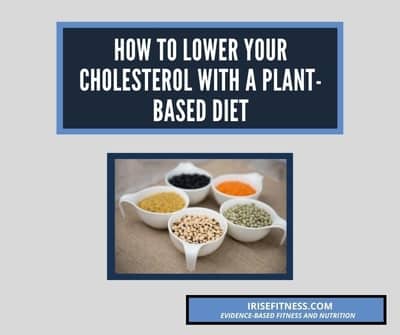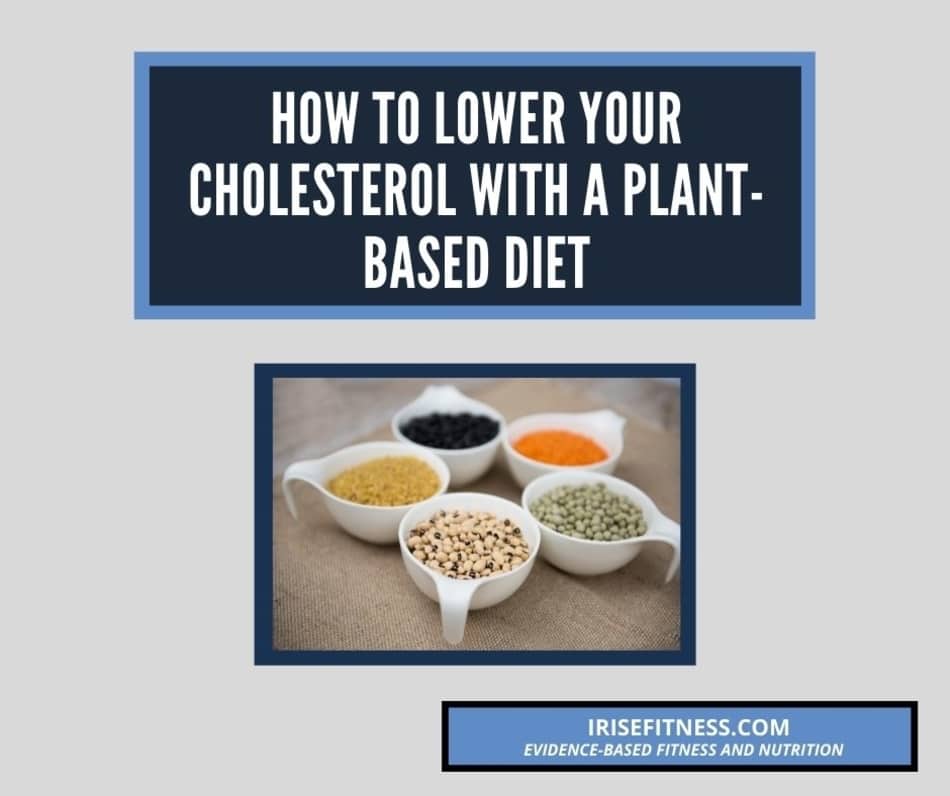
Is cholesterol bad for you? Is it totally fine to eat? Can you eat 5 eggs a day because eating cholesterol doesn’t raise your blood cholesterol levels? Or does it? Does elevated cholesterol levels put you at an increased risk of heart disease?
There are a million questions people have about cholesterol and the worst part is, most things online about cholesterol, even from “reputable sources,” are simply inaccurate.
That is the reason I wrote this article. So I can answer those questions you may have and cover all the misconceptions out there about cholesterol.
We’ll review the actual science, not just what people want you to believe.
What is cholesterol?
Cholesterol is a type of lipid – it is a waxy substance found in your blood.
There are two types of cholesterol: LDL (“bad”) cholesterol and HDL (“good”) cholesterol.
Your body needs a certain amount of cholesterol to build cells and make vitamins and hormones.
Cholesterol comes from two sources. Your body makes it, but you can also get cholesterol through your diet. Animal products (meat, dairy, eggs) are the only foods that contain cholesterol. Plant foods don’t contain any cholesterol.
Luckily for us, we don’t need to eat animal based foods to get cholesterol because our liver makes all of the cholesterol we need.
Let’s dive right into the most common misconception people have about cholesterol and I will explain how “science” has skewed people’s beliefs about cholesterol.
“Eating Cholesterol Doesn’t Raise Serum (Blood) Cholesterol”
Many people have heard this statement and unless you’re the 1%, you likely currently believe this statement. After all, it’s plastered all over the web – if you look up any information about dietary cholesterol and serum (blood) cholesterol, you’ll likely be told there is essentially no relationship between the two and that you should feel fine about eating all the eggs you want.
And unfortunately, they are wrong. Let’s take a look at how.
There are two main ways industry twists “science” to show that dietary cholesterol doesn’t impact blood cholesterol levels.
1. Studies often looking at fasting cholesterol levels
The image below comes from this study, which shows what happens to your blood cholesterol levels after eating a meal containing no cholesterol (bottom line) compared to meals containing different amounts of dietary cholesterol (all of the lines above the bottom line) from eggs.

What you’ll notice is that when you consume dietary cholesterol, your blood cholesterol levels spike.
But then after a certain period of time (4, 5, 6, 7 hours), your cholesterol levels begin to decrease.
The egg industry has a lot of influence and is well aware of this data. So when they conduct studies, their goal is to show that dietary cholesterol has no impact on blood cholesterol levels. So what they do is manipulate the study and collect their data at times that show no statistical difference in blood cholesterol levels.
For example, when they collect data on people’s cholesterol levels before a meal and then 12 hours after a meal, your blood cholesterol levels have dropped back down towards “fasting levels.” As a result, they’re able to reach the conclusion that added dietary cholesterol doesn’t raise blood cholesterol.
In reality, we don’t eat once and then fast. We have breakfast, then lunch, then dinner, and typically snacks in between. So if you eat a typical diet that contains animal products (and therefore cholesterol), then your cholesterol levels will constantly be elevated.
The second way industry skews studies to show dietary cholesterol doesn’t raise blood cholesterol levels is through:
2. The Ceiling Effect
When you take a look at this study, the graph below shows the relationship between added dietary cholesterol and blood cholesterol levels in people who normally eat different amounts of cholesterol on a daily basis.
What you notice is that if you take someone who doesn’t eat any cholesterol on a daily basis and then have them eat foods containing cholesterol, their blood cholesterol levels increase dramatically.
On the contrary, if you take someone who normally eats less than 3 eggs worth of cholesterol each day (eating this much cholesterol each day is very common in the United States) and you give them a high amount of dietary cholesterol on top of that, their blood cholesterol levels hardly change.
This is called the ceiling effect.
At a certain point, adding more dietary cholesterol to a diet already high in cholesterol is not going to impact blood cholesterol levels all that much.
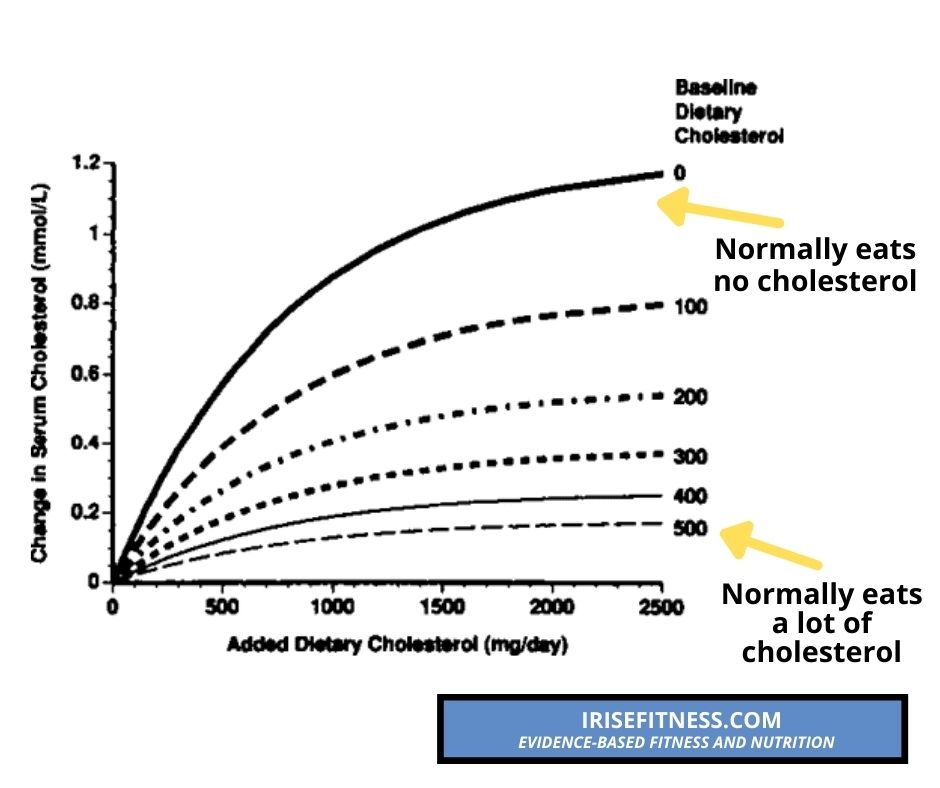
And this is exactly how industry funded studies do their research. They know that if they take participants who eat a “standard diet,” which already contains a fair amount of cholesterol, and they give them more cholesterol through their diet, their blood cholesterol levels will hardly move, making the increase “statistically insignificant.”
As a result, they can reach the conclusion that “dietary cholesterol doesn’t impact blood cholesterol levels.”
On the other hand, if they did these studies on vegans who eat 0 dietary cholesterol (because cholesterol is only found in animal products), then their numbers would show drastically different results. As seen in the graph above, their blood cholesterol levels would increase dramatically.
It’s quite sneaky, isn’t it?
This is exactly why you can’t trust everything you read online – except on my page because we actually look at the real science;)
So to sum this up, dietary cholesterol DOES increase blood cholesterol levels, but to a much lesser extent if you already are eating a diet that contains animal products and therefore cholesterol (because your blood cholesterol levels are already elevated).
Eating Both Cholesterol And Saturated Fat Raises LDL (bad) Cholesterol
It’s important to emphasize that eating cholesterol and saturated fat raises your LDL (bad) cholesterol. This study had every participant eat the same diet for two weeks to get a baseline and then divided them into several different diet groups, varying their intakes of saturated fat and cholesterol.
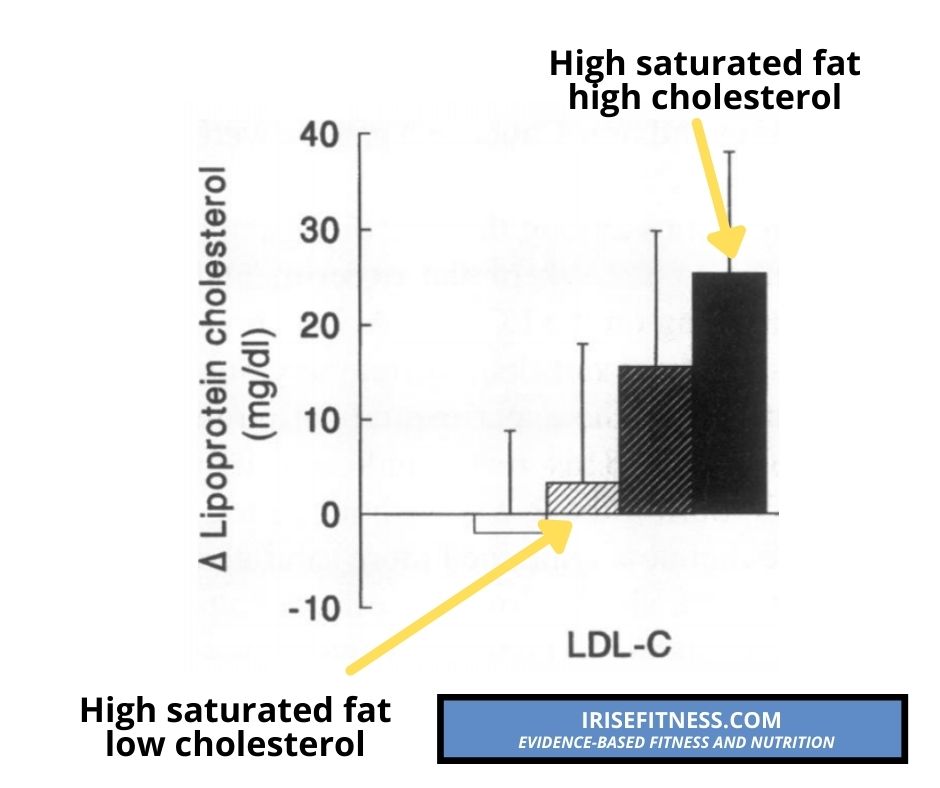
After four weeks, the above image shows the results. The lightly shaded bar shows the raise in LDL (bad) cholesterol for the high saturated fat/low cholesterol group. The black bar on the far right shows the raise in LDL cholesterol for the high saturated fat/high cholesterol group.
This study shows that dietary cholesterol raises LDL (bad) cholesterol. But it also highlights the fact that pairing a high saturated fat diet with a high cholesterol diet is the worst of both worlds.
This is why it is important to limit cholesterol AND saturated fat if you are looking to reduce your cholesterol levels and optimize your health.
Does High Cholesterol Increase Risk of Heart Disease?
There is a ridiculous amount of information out there about how high cholesterol doesn’t cause heart disease. This is simply false and this misinformation is killing people, literally. High cholesterol does greatly increase your risk of developing heart disease. Let me explain.
Research has well established that there is a causal relationship between LDL cholesterol and the risk of coronary atherosclerosis (damage or disease to the heart’s blood vessels).
Data from over one million participants in over 100 prospective studies have demonstrated that those who have higher cholesterol are at higher risk of developing heart disease.
Research also shows that lowering your cholesterol reduces your risk of heart disease.
More specifically, this study shows that men in their 20s and 30s who have a total cholesterol under 200 have a substantially longer estimated life expectancy (3.8-8.7 years) than those who have total cholesterol over 240.
Most of the data we have to make these assumptions comes from observational data because it would be unethical to set up a controlled clinical trial where people’s high blood cholesterol levels were either treated or not treated. So some people will see this data and say “correlation doesn’t equal causation.”
Luckily for us, there’s more research to fall back on that is quite clear evidence, if it isn’t obvious already, that cholesterol heavily impacts heart disease.
Genetically Low Cholesterol Levels
There are certain genes that impact our baseline cholesterol levels. There are certain genetic mutations some people inherit that result in abnormally low baseline cholesterol levels.
About 1 in every 40 African Americans have a mutation that, according to this study, reduce their plasma cholesterol levels by 28%. Even though over half the Black participants in this study had high blood pressure, almost one third smoked, roughly 20% had diabetes, the participants with genetically low LDL levels had a significant reduction in the risk of developing Coronary Heart Disease.
More specifically, the researchers conclude that “the nonsense mutations that lowered plasma levels of LDL cholesterol by about 40 mg/dl were associated with an 88 percent reduction in the incidence of CHD, whereas the PCSK946L allele, which lowered LDL cholesterol levels by about 20 mg per deciliter, was associated with a 50 percent reduction in CHD.”
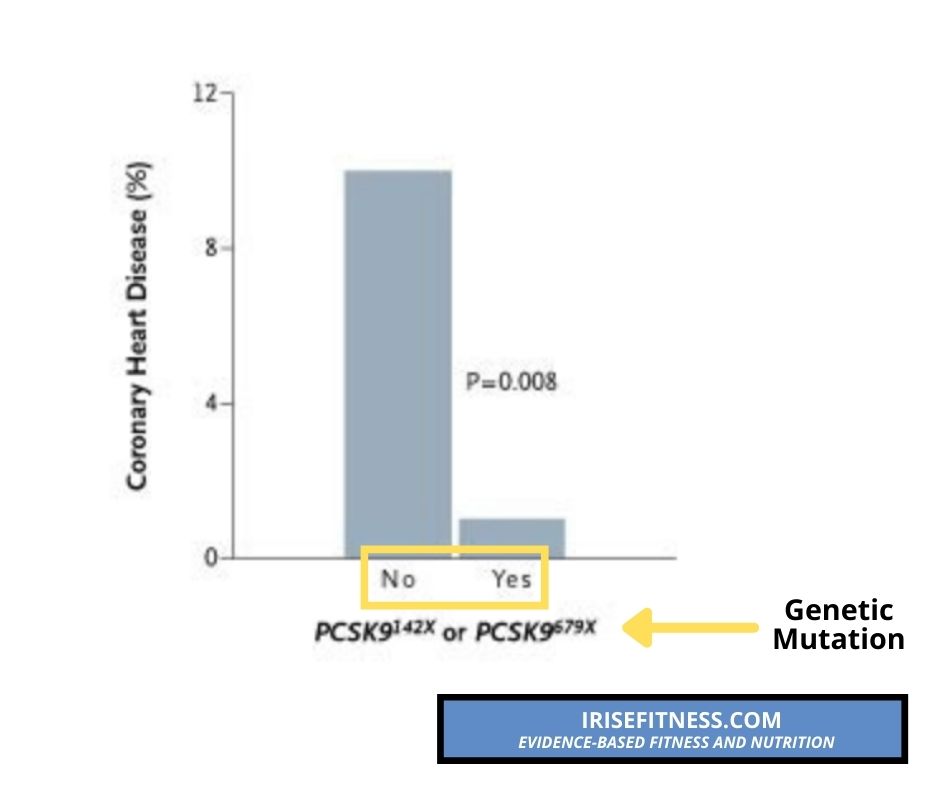
Now that’s pretty crazy. Those with genetically low cholesterol levels have a drastic reduction (88%) in the incidence of Coronary Heart Disease, even when you don’t account for other lifestyle factors. This provides even more evidence that blood cholesterol levels do impact your chance of developing heart disease.
It’s important to note that research shows that long term reduction in LDL cholesterol lowers your chances of developing Coronary Heart Disease by three times compared to statins taken later in life that lower your cholesterol by the same amount.
In other words, by maintaining low LDL cholesterol throughout your life (and it’s never too late to start!), you’ll be much better off than controlling it with medication later in life once it gets bad.
Now sharing this data about genetically low cholesterol levels is not to make you think that genetics play a really large role. They do play somewhat of a role, but more importantly, I’m highlighting the fact that cholesterol levels do in fact play a large role in heart disease risk.
So doing your best to keep your cholesterol levels in the normal range will set yourself up for living a healthy lifestyle and lower your chances of developing heart disease.
What Are Optimal/Normal Cholesterol Levels
“Normal” cholesterol in the United States is actually higher than what it should be. We consider normal cholesterol to be anywhere between 100-129 mg/dl, but that is actually higher than what the research shows is optimal.
In other words, “normal” in the United States isn’t “optimal.” We know this because research shows that “normal” LDL (bad) cholesterol levels range from 50 to 70 mg/dl for “native hunter-gatherers, healthy human neonates, free-living primates, and other wild mammals (all of whom do not develop atherosclerosis).”
So it appears that people who have LDL cholesterol levels between 50 and 70 mg/dl do not develop atherosclerosis (the clogging of your arteries).
Which Group of People Have Cholesterol Levels In This Range?
Which group of people have LDL cholesterol levels within this range?
Vegans who eat 0 dietary cholesterol.
As you can see from this study, the table below demonstrates that vegans (individuals who eat no animal products) have the lowest levels (by a substantial amount) of both total cholesterol and LDL (bad) cholesterol compared to both vegetarians and omnivores.
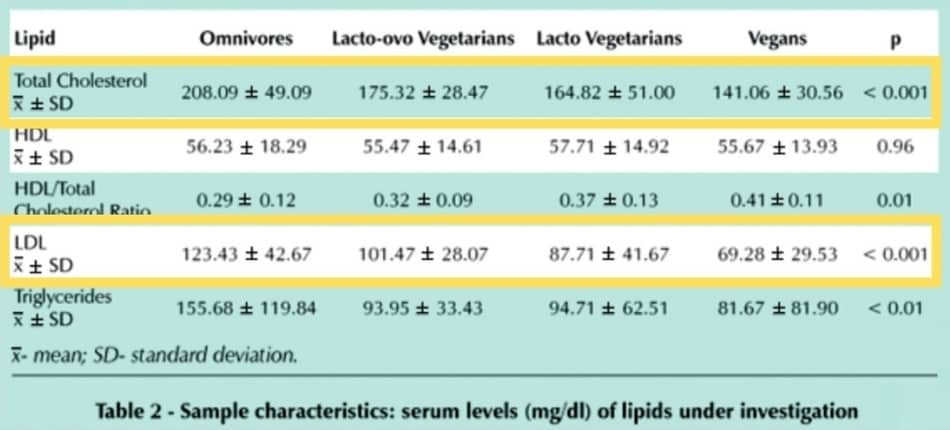
In addition to this exemplifying the type of diet you should eat if you want to reduce your cholesterol levels, this also provides more evidence, if you’re not already convinced, that the foods we eat do, in fact, affect our blood cholesterol levels.
After all, this research shows that the people who eat no cholesterol have by far the lowest blood cholesterol levels.
And interestingly enough, as if there’s not enough proof yet, people who eat a whole foods plant-based diet have the lowest rate of heart disease.
How Do We Reduce Our Cholesterol Levels?
Considering the fact that cholesterol is only found in animal products (meat, dairy, and eggs), limiting, or removing, those products from your diet is most important.
But, it’s not helpful to eliminate those foods and replace them with processed foods.
Instead, replacing those foods with whole, plant based foods (fruits, vegetables, legumes, grains, nuts, and seeds) will be most optimal for reducing your cholesterol levels and promoting optimal health.
And remember to pay attention to saturated fat. While most of the saturated fat we get in our diet is from animal products, plant-based foods that are processed may also contain high levels of saturated fat.
So keep an eye out for that and try to eat mostly whole, plant-based foods if you’re looking to optimize your health.
Conclusion
In conclusion, there’s a lot of misinformation out there when it comes to cholesterol and its impact on human health. Eating dietary cholesterol and saturated fat does increase blood cholesterol levels. Furthermore, having elevated cholesterol levels does put you at a substantially higher risk of developing heart disease.
As I just alluded to, increasing your consumption of plant-based foods and limiting your consumption of animal products (which have high levels of cholesterol and saturated fat) is most beneficial for reducing blood cholesterol levels and optimizing your health.
I think it’s very important to understand that this does not need to be all or nothing in order to improve your health.
If you are reading this article and you are not interested in fully switching over to a plant based diet, that is totally fine. But understand that you will only benefit your health if you start incorporating more plant-based foods into your diet.
The transition doesn’t have to be over night and you don’t need to feel the need to 100% cut out animal products in order to be healthy.
Yes, if you are trying to get your cholesterol levels in optimal range and you want to maximize your health, the more plant-based foods and fewer animal products you can include into your diet, the better off you’ll be.
That’s all for this article. I hope you learned something new. And if you know someone who has high cholesterol or simply might find this article interesting, I’d love for you to share the link with them! After all, the more people who are aware of this information, the healthier we’ll be as a society.
And if you want more daily information about diet and exercise, follow me on Facebook at https://www.facebook.com/devin.mcnamara.77.
And lastly, if you’re looking for more of a general explanation about why I recommend a plant-based diet to optimize your health, then check out this article here.
Online Plant-Based Fitness and Nutrition Coaching
So if you are looking for a coach (who understands a plant-based diet) to help keep you accountable and create a plan specifically for you, I recently opened up a few spots for my online fitness and nutrition coaching. Here’s what it includes:
- Customized workout routine that is tailored to your goals based on your schedule/available equipment.
- Tailored plant-based nutrition coaching so you can reach your goals while optimizing your health.
- Integrated support system that allows you to be held accountable throughout your journey.
If you’re interested in working with me so you can reach your fitness and nutrition goals, feel free to reach out as I’d love to talk more about whether we might be a good fit for each other. Find out more here!
Disclaimer
This information is intended for healthy individuals. Before beginning to implement any dietary changes, you should have a discussion with your doctor or licensed healthcare provider.
The information within this article is not intended to replace medical treatment or advice. This information is not intended to treat any illness or disease. Rather, as a nutritional guide, this information is for educational purposes only and is not intended to replace medical care or advice as part of a healthy lifestyle. If you choose not to obtain the consent of your physician and/or work with your physician before implementing information learned in this article, you are agreeing to accept full responsibility for your actions. Not all people respond to food the same way, so if you experience difficulty with digestion, allergic reaction, or any other issues, please consult your doctor or licensed healthcare provider.

